They're reimagining the future of food in south Phoenix. Here's how you can be a part of it
Young chaparral shrubs have emerged near the corner of 15th Avenue and Vineyard Road. Their neighbors, a safe distance away, are young too: Wolfberry seedlings, aloes sprouting their first lances, moringa saplings with their skinny spines. Red, round chiltepín peppers, the size of a dime, have already come in.
These drought-tolerant plants — some indigenous to the Southwest, some not — have medicinal uses. Chaparral can be made into a salve to treat bruises and minor cuts.
Chiltepín peppers add spice to your food, but the leaves can also be dried for tea, said local chef Maria Parra Cano, as she made her way out of the trenches and held out a palmful of the fiery little peppers on a recent afternoon.
The littlest ones are the hottest, warned her husband Brian Cano from beneath a straw cowboy hat.
The Canos are part of a small group that started the Food Forest Cooperative, a farm cooperative in south Phoenix. They, along with Alexis Ruby Trevizo, Nelli Evans and Ali LoPiccolo, have the vision of one day using their 1.25-acre plot to help heal and feed families in south Phoenix.
“I think the biggest thing for me was the amount of buy-in that everybody has because we all share ownership of the business once it incorporates,” Brian said. “So we all have skin in the game. We have something at stake to ensure that this succeeds.”
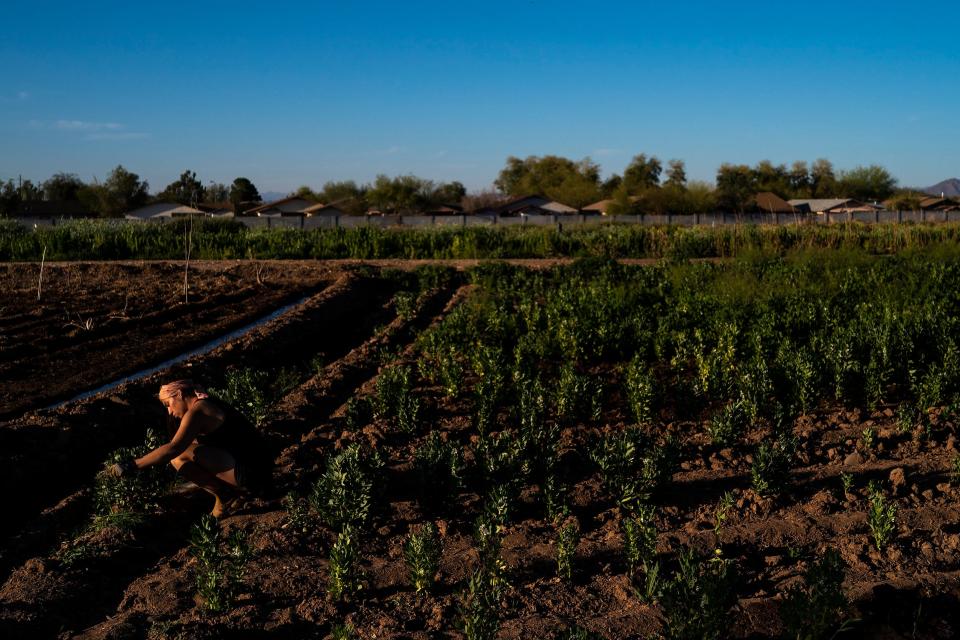
What is a food cooperative?
The Food Forest Cooperative takes up the southwest corner of Spaces of Opportunity, a community garden that sits on land owned by Roosevelt Elementary School District. The new project's founders are in the process of incorporating as a cooperative business, said Brian Cano.
Brian and Evans met at a co-op training program for veterans organized by Thrive Consultancy. The group aims to incorporate this program this spring.
Unlike the common corporation, which is owned by shareholders, a co-op is owned by employees or consumers who use the business’s services. These owners are referred to as members.
Once plants are ready for harvest, the Food Forest Cooperative has plans to sell them through a variety of means, such as online pick-up orders and a farm stand that will be open throughout the week. The cooperative will also make herbal tinctures.
Other cooperatives in Arizona include Food Conspiracy Co-op, a grocery store in Tucson owned by approximately 3,000 members, and Phoenix Food Co-op, a buyers club that’s working toward opening a brick-and-mortar shop. Coldwater Coffeehouse in Avondale — part coffee shop, part bakery, part farm — is also experimenting with the co-op model.
A 'kinder' grocery store: These Phoenix neighbors want to change how we shop
Anyone in Phoenix who's interested in getting involved with the Food Forest Cooperative can contact follow them on Instagram or Facebook for the next team meet-up, or email foodforestcooperative@gmail.com.
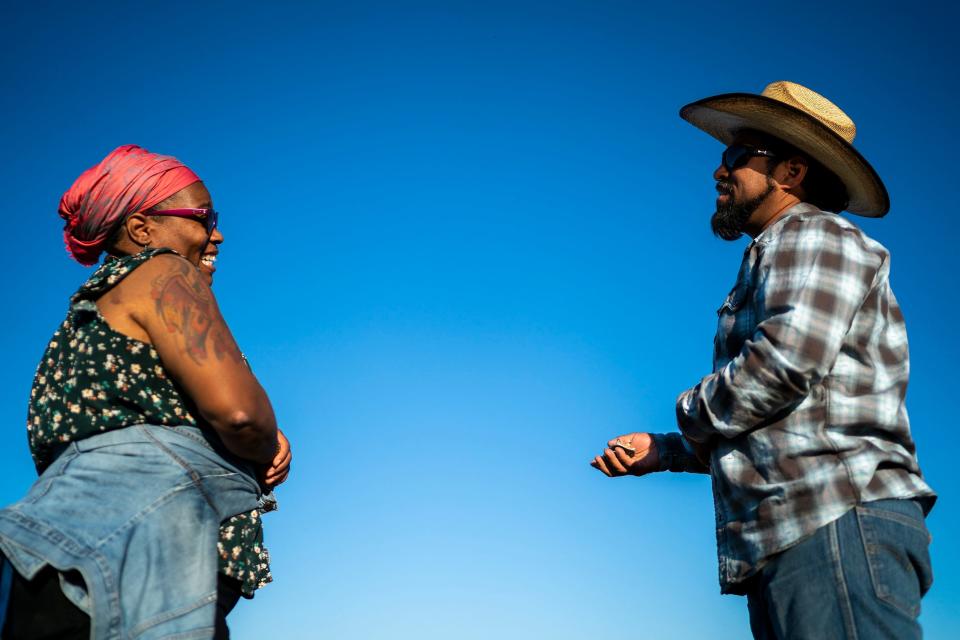
Addressing food insecurity in south Phoenix
Maria described the Food Forest Cooperative as a multi-generational project that members preserve for their children, and their children’s children. She wants people in south Phoenix to feel empowered to take ownership of it and reconnect with their ancestors through the land.
She also sees the co-op as a way to address food insecurity in south Phoenix.
South Mountain Village, a large neighborhood that’s historically served Black and brown communities, encompasses the area between a dried-up section of Salt River and the ridgeline of South Mountain, from 27th Avenue to 48th Street.
The predominantly low-income area has the highest concentration of food deserts in Phoenix. A food desert is an area that has limited access to affordable and nutritious food. Research from the Journal of Economics suggests that affordability matters more than proximity when it comes to getting healthy food to people living in poverty.
More: Resources for metro Phoenix families facing food insecurity during COVID-19
Of the 43 food deserts identified by the city, 18 are fully or partly in south Phoenix, The Arizona Republic reported in 2020. The Food Forest Cooperative is one of several projects people have started in response to the widespread food insecurity. In another part of south Phoenix, Arizona Fresh Holdings LLC is working with the city to turn a former dump site, the Del Rio Landfill, into a food distribution center and farmers market.
The term “food desert” itself is up for debate. Food activists, including Phoenix’s queer mutual aid network NOURiSH, prefer the term “food apartheid.” Unlike a desert, a naturally occurring ecosystem that's abundant with life, an apartheid points to systemic discrimination designed by humans.
Spaces of Opportunity is surrounded by residential homes, and Maria wants to get input from families living there about the best way to serve them.
“This co-op model is not anything new,” Maria said. “Communities have functioned this way for hundreds of years. … I feel like we’ve really assembled a solid team to be able to look at this business model from a community lens, a regenerative healing lens.”
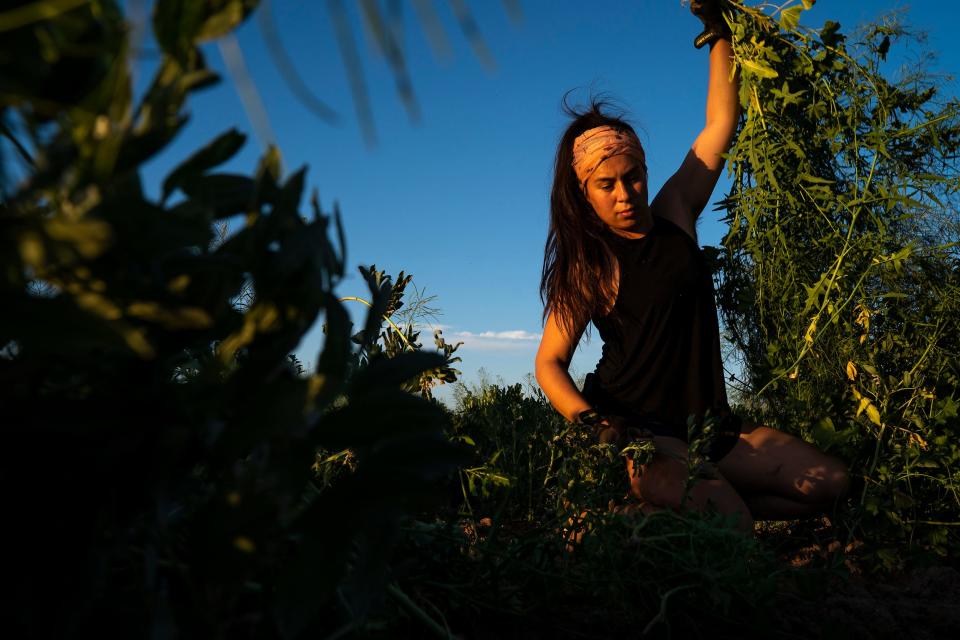
She already has plans to convert a shipping container that sits on their plot into a farm stand. Since the Spaces of Opportunity farmers market only operates at a certain time every Saturday, a retail stand open more frequently could make locally-grown food more accessible.
Spaces of Opportunity: How Black farmers find 'peace' at this south Phoenix garden
‘We all have our own strengths’
This spring the group planted more than two dozen trees standing three feet tall: plum, peach, fig, pomegranate and mulberry.
Members of the Food Forest Cooperative can contribute different skills, from administrative work to manual labor to community education. Brian can weld and she can cook, Maria said. She and Evans are also knowledgeable in traditional medicine.
And it's a learning opportunity for everyone involved.
Brian grew up in Tornillo, a border town in Texas outside El Paso. It’s an agricultural community where his grandfather used to raise cattle and grow crops. His father traveled throughout the West as a migrant farmworker. After his dad went to college and earned a master’s degree in education, the family moved to a suburb of El Paso and left the farming life behind. His father died in early 2021.
“I didn’t really have a background doing any of this stuff until I started later in life, which is really unfortunate because there’s generational knowledge that was lost,” Brain said. “He’s not around anymore so I can’t ask him, ‘Hey, one of the things you used to do, how did you do it?’”
Evans grew up in the American South and has family in Mississippi and Georgia. Her father’s side of the family were farmers and there was always food on the table, she said.
“Just being able to have that conversation with my father, and that connection, like he’s happy,” Evans said. “He’s happy to see I’m continuing his legacy.”
At some point in the late afternoon, Evans took off her shoes and let her feet sink in the mud, the soil soft and cool from irrigated water. Every plant in the soil around her has some kind of health benefit.
The wolfberry, also known as goji, is rich in zeaxanthin, an antioxidant, and a carotenoid called lutein, which can help reduce the risk of eye disease. Moringa leaves are high in vitamins A, B6 and C, as well as other nutrients. Mugwort, "the mother of herbs," has been used for centuries to treat digestive ailments and irregular menstruation.
For Evans, growing medicinal plants is part of her spiritual journey. She practices Ifá, a traditional Yorùbá faith system. Evans, who works as a spiritual consultant, described Yorùbá medicine as a holistic approach that addresses more than just a specific ailment, but the well-being of mind, body and spirit.
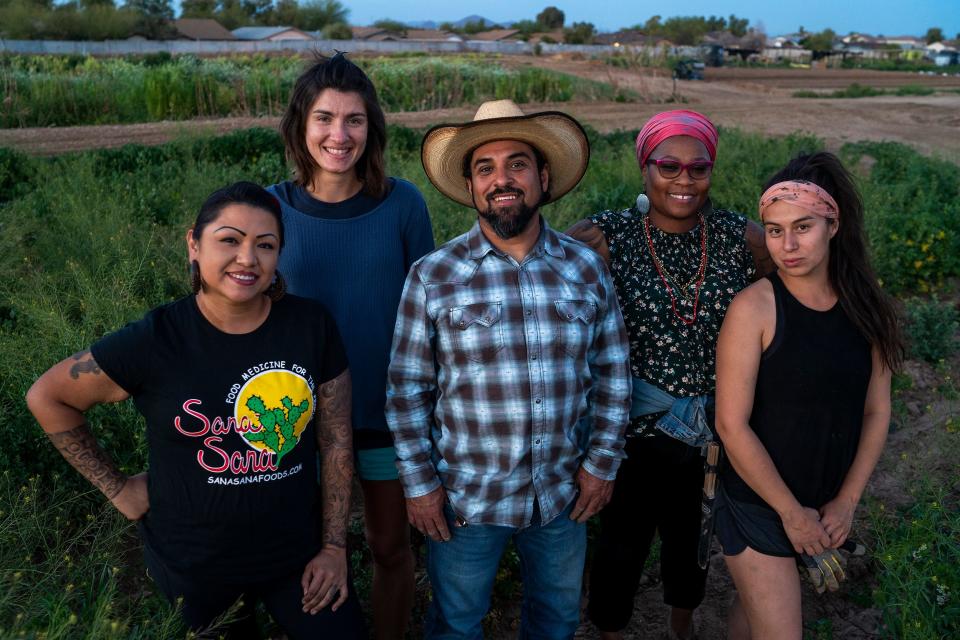
Trevizo is the group's "plant lady," Maria said.
That afternoon Trevizo was deep among the fava beans, pulling out weeds. Their goal is to create a multi-layered canopy with mature trees growing taller, and then shrubs, herbs, vegetable and fruit crops at the bottom, she said.
Location and timing matters. Chaparral, known as la gobernadora or "the governess," can kill other plants, so they've isolated those burgeoning shrubs. Fava beans add nitrogen to the soil, so they've planted them first to prep the soil for trees, Trevizo said. Their biggest challenge in the summer will be minimizing sun exposure on the soil to protect the microbes in the top layer.
Trevizo said she got her knowledge through watching YouTube videos, reading books, and talking to other farmers. There was also a lot of trial and error from turning her own home into a food forest.
Growing up in different parts of the Valley, Trevizo said she's experienced first-hand the disparity in food options different neighborhoods have.
Ali LoPiccolo, who was weeding beside Trevizo, is a graduate student at Arizona State University studying sustainability and has an undergraduate degree in business.
Sustainability has three pillars: the environmental, social and economic aspects, LoPiccolo explained. The environmental pillar deals with caring for the land, which is what regenerative farming at the co-op addresses. The social pillar looks at human rights, such as food justice in south Phoenix. The economic pillar looks at factors such as the wage equity and gap between the highest-paid and lowest-paid employees.
She said that there's a misconception that profitability and sustainability can't coexist. LoPiccolo defined sustainability as "providing for the needs of the present without compromising the ability of future generations to meet their own needs."
'We can build something big':Friends grow vegetables and community in Avondale
Making healthy foods accessible long term
"The idea is hopefully it doesn't become like this hippy-dippy white thing," Trevizo said. "I think, just in commercial and popular culture, farmers markets have been seen as a thing of privilege and expensive foods and expensive products."
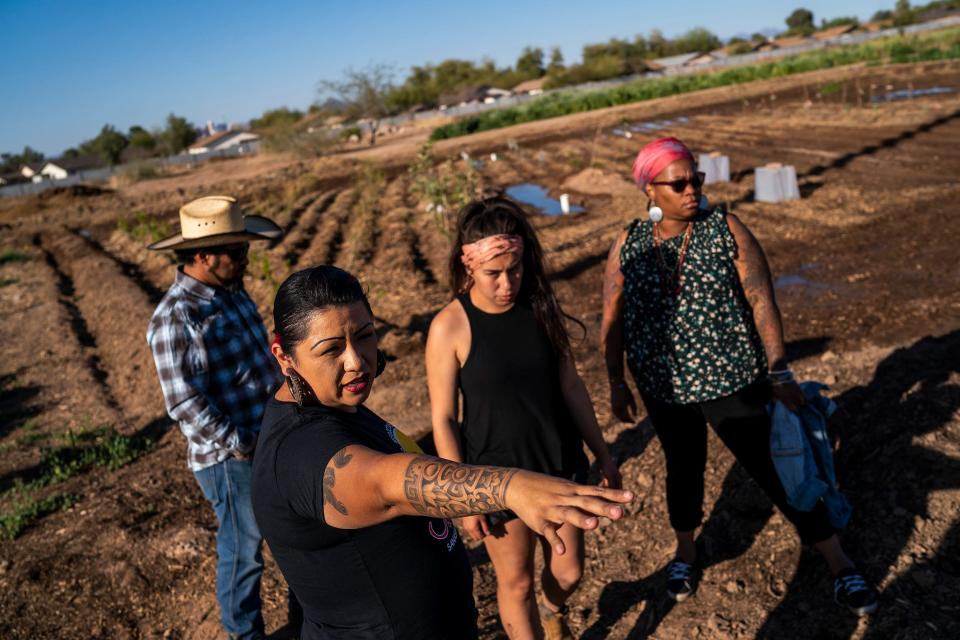
Accessibility will be key to the Food Forest Cooperative's success, such as giving people the option to pay with food stamps and making sure their outreach, from social media marketing to in-person meet-ups, is offered in Spanish, Maria said. The group is also looking at offering a sliding scale for membership fees.
The Food Forest Cooperative recently received a grant from Phoenix to start a greenhouse and build shade structures, Maria said.
"Back in the days, I'm sure each community had their their healer, their medicine keeper," Maria said. "They have their storyteller, they had somebody who they would go to for specific knowledge. And I feel like our cooperative functions very much in that way, too."
Details: The Food Forest Cooperative is located at Spaces of Opportunity, 1200 W. Vineyard Road, Phoenix.
For updates or ways to participate, follow on Instagram at instagram.com/ffc_phx or Facebook by searching 'The Food Forest Cooperative'. You can also email the group at foodforestcooperative@gmail.com.
Elsewhere in Phoenix: How Somali refugee moms are feeding families in the Valley
Reach the reporter at Priscilla.Totiya@azcentral.com. Follow @priscillatotiya on Twitter and Instagram.
Subscribe to azcentral.com today to support local journalism.
This article originally appeared on Arizona Republic: The Food Forest Co-op fights food insecurity in Phoenix. Here's how

